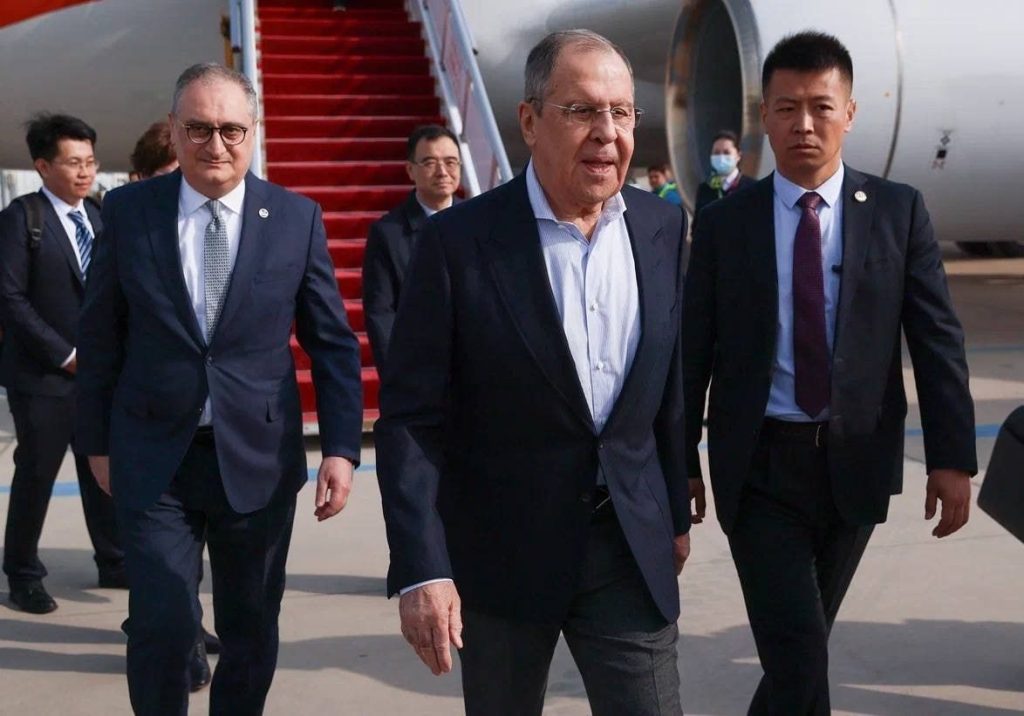Russian Foreign Minister Sergei Lavrov’s visit to Beijing, China, to meet with his Chinese counterpart, Wang Yi, highlights the close ties between the two countries during Russia’s war against Ukraine. The two officials are expected to discuss cooperation in the international arena and address “hot topics,” including the ongoing conflict in Ukraine. Beijing has been a key supporter of Moscow, increasing economic cooperation and undermining Western attempts to isolate Russia. The West, however, remains wary of China’s alignment with Russia and is urging Beijing to use its influence to bring an end to the war in Ukraine.
The United States has raised concerns about China’s growing support for Russia, which includes providing geospatial intelligence to aid Moscow in its military operations. Despite these concerns, Russian President Vladimir Putin is reportedly planning to visit China in May to meet with Chinese President Xi Jinping. The European Union’s top diplomat, Josep Borrell, has called on China to support Ukraine’s peace proposals and encourage Russia to engage in negotiations for a peaceful resolution to the conflict. Borrell emphasized the urgent need for an end to the war in Ukraine and stressed the importance of diplomatic efforts to achieve peace in the region.
The meeting between Lavrov and Wang Yi underscores the strategic partnership between Russia and China, especially in the face of Western pressure and criticism over their actions in Ukraine. The close relationship between Moscow and Beijing has emerged as a challenge to Western alliances and has raised concerns about the shifting geopolitical landscape in Eurasia. While the West continues to condemn Russia’s actions in Ukraine and urge for a peaceful resolution, Russia and China are strengthening their cooperation and expanding their economic ties, further complicating the situation in the region.
China’s role in the Ukraine conflict has become a contentious issue, with the country balancing its support for Russia with the pressure from Western countries to take a more active role in resolving the crisis. As Beijing deepens its ties with Moscow, it faces increasing scrutiny from the international community and must navigate a complex diplomatic situation. The upcoming visit of Putin to China indicates the growing strategic partnership between the two countries and their shared interests in countering Western influence in the region. The dynamics between Russia, China, and the West are evolving, shaping the geopolitical landscape and influencing international relations in the aftermath of the conflict in Ukraine.
The diplomatic efforts of Lavrov and Wang Yi in Beijing highlight the complex geopolitical dynamics at play in the aftermath of Russia’s war against Ukraine. The meeting between the two foreign ministers underscores the strategic alignment between Russia and China, as well as the challenges faced by Western countries in dealing with their cooperation. The conflicting interests and alliances in Eurasia highlight the shifting power dynamics in the region and the need for diplomatic engagement to address the ongoing conflict in Ukraine. As Russia and China deepen their partnership, the international community must navigate the complexities of the situation and work towards a peaceful resolution to the crisis.
In conclusion, the visit of Russian Foreign Minister Sergei Lavrov to China signifies the close relationship between the two countries amidst the ongoing conflict in Ukraine. The strategic partnership between Moscow and Beijing has challenged Western interests in the region and raised concerns about China’s role in supporting Russia. The upcoming meeting between Putin and Xi Jinping further underscores the growing alliance between Russia and China, shaping the geopolitical landscape in Eurasia. The diplomatic efforts of Lavrov and Wang Yi reflect the complex dynamics at play in the aftermath of the war in Ukraine and highlight the need for international cooperation to achieve a peaceful resolution to the conflict.


